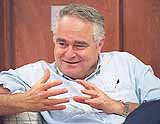By Curtis Lum
Advertiser Staff Writer
Michel Oksenberg, former president of the East-West Center and a pre-eminent expert on China, died yesterday in California. He was 62.
 |
| Michel Oksenberg was president of the East-West Center from 1992 to 1995. |
Oksenberg was selected president of the East-West Center in 1992 and resigned in 1995 after an often stormy tenure. His managerial skills came under scrutiny, but what was never debated was his knowledge of Asia, particularly China.
"There are a lot of people that know a lot about China and have a lot of good ideas, but they don’t know what ideas can actually be implemented," said Ralph Cossa, executive director of the Pacific Forum think tank. "Mike had a sense of political reality and so he knew how to put the things together and to explain it in a way that made sense to decision-makers. He had a sense for what was realistic, as opposed to what was a wonderful idea in a perfect world, except we don’t live in a perfect world."
From 1977 to 1980, Oksenberg served on the National Security Council, with responsibility for China and Indochina (Cambodia, Laos and Vietnam). Cossa said Oksenberg had the ability to work with both Republicans and Democrats.
"He had an incredible intellect and an ability to get to the heart of the problem and to synthesize it in a way that was very clear and very direct and very objective," Cossa said.
Oksenberg was born in Belgium on Oct. 12, 1938 and moved with his parents to the United States when he was seven months old. He grew up in Virginia and Florida.
Oksenberg earned his master’s degree and doctorate in political science from Columbia University. He worked on the faculties of Stanford University, Columbia and the University of Michigan, where he also served as director of the Center for Chinese Studies.
A prolific writer, Oksenberg authored many books on China and also served as a consultant to several political think tanks.
Web Nolan, formerlythe East-West Center’s director of public affairs, described Oksenberg as an excellent educator.
"He could really stimulate your thoughts about Asia, and especially about China," Nolan said. "My father had been a journalist in China during the revolution in the 1920s so I learned a lot from him. But Mike was the guy who taught me how to be more sophisticated about it."
Although he was quite ill over the past six months, Oksenberg wrote an article on China that was published in the Pacific Forum’s newsletter, and he had just completed a piece on China-Japan-U.S. relations with current East-West Center president Charles Morrison.
"He was a tremendous asset in U.S.-Asia Pacific relations," Morrison said. "As a brilliant scholar and committed teacher, he trained an entire generation of younger China scholars. He was a powerful force in intellectual and policy issues in shaping thinking about the implications of China’s role in the international system."
Morrison said Oksenberg left many legacies at the center. But his biggest legacy had little to do with foreign policy or politics.
"The most important one and the most positive one was he was very interested in the arts program and he transformed what was really a small auditorium (at the East-West Center) into an art gallery," Morrison said.
Oksenberg is survived by his wife, Lois; son, David; and daughter, Deborah. Services are pending.
[back to top] |

